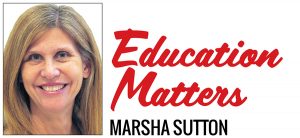Education Matters: Understanding the dangers of national strife
February 5, 2021
 For the past 20-plus years, I’ve written columns about local K-12 education: school boards, curriculum issues, finances, bond measures, lawsuits, pay-to-play and other controversial subjects.
For the past 20-plus years, I’ve written columns about local K-12 education: school boards, curriculum issues, finances, bond measures, lawsuits, pay-to-play and other controversial subjects.
I don’t write about political insurrection. Until now. If anything has educational value, the Jan. 6 assault on the U.S. Capitol sits near the top.
The last time we witnessed terrorism to this degree on American soil was on 9/11/01. Then, our country was united as we symbolically embraced one another, mourned our dead and joined together to condemn and oppose terrorist attacks from without.
But 1/6/21 was domestic terrorism — terrorists from within, citizens who live among us.
Just because this shocking event has passed is no reason to become complacent – 1/6/21 is surely not a one-off.
Sadly, we learned how fragile our democracy is … and how it can be threatened by extremist ideology, fringe movements and false conspiracy theories asserted by mendacious political leaders.
We also learned how resilient and robust America can be.
To use an old expression, this is a teachable moment. But not just for children.
We could all benefit from a refresher course on the rights enshrined in our U.S. Constitution and Bill of Rights — because if we don’t know, how can we expect our kids to know?
Most of what children learn comes from the home. Parents are a child’s first and foremost teachers. Hatred, racism, bigotry and xenophobia have to be carefully cultivated for children to adopt intolerant values.
The classroom presents difficult challenges.
I’m not convinced that it’s the job of teachers to “investigate feelings” as one educator phrased it. We already ask a lot of our teachers.
But never before has social and emotional learning been more necessary.
Schools today need more psychologists and mental health experts to combat this unprecedented surge in anxiety and depression for children suffering from the challenges of distance learning, social isolation, economic uncertainty, a pandemic and now our national strife.
In addition, the drought of civics education in schools has to be addressed.
It’s a disgrace that surveys show that far too many kids (and adults as well) can’t name the three branches of government and know so little about the Declaration of Independence, the Constitution and the Bill of Rights.
“Teach our kids how to run our country, before they are called upon to run our country. If we don’t, someone else will run our country.”
This statement is from The Dreyfuss Civics Initiative, founded locally by actor Richard Dreyfuss.
The website offers valuable assistance for parents, teachers and the public on understanding how our government works and why civics lessons should be as essential a component of every child’s education as math and English.
Discussions of this ugly Jan. 6 incident in our country’s history will be studied for years to come, for being what came very close to a breakdown of our democratic society.
Kids need to understand the potential consequences of such treasonous actions and how incendiary words from national leaders can sow the seeds of internal political unrest that can threaten to topple our government.
Free speech
In a recent webinar, renowned New York Times columnist Tom Friedman said that democracy is based on truth and trust. These two pillars of America’s promise to the world are belief in the fairness of America’s elections and the peaceful transition of power.
The storming of the U.S. Capitol represented a rejection of both of these basic American principles.
Our founders created a democratic nation under remarkable sets of documents that guarantee rights, freedom and liberty unlike any before. Integral among these visions was freedom of speech.
“I may disapprove of what you say but I will defend to the death your right to say it.”
This quote, attributed to Voltaire (but actually written by historian Evelyn Beatrice Hall), defines one of the great hallmarks of a democratic society. But there are limits.
When free speech turns to hate speech or incitement to commit violence, that boundary is breached.
The widespread influence of social media places a burden on parents and educators to also teach kids to distinguish between free speech and hate speech — and how to sift through the nonsense to find what’s true.
When the truth can so easily become twisted, or when lies are invented, kids should understand how fabrications can be convincingly distorted and know how to identify fact from fiction.
“Alternative facts,” as they’ve been called, simply don’t exist — no matter who is saying it or how desperately one might want to accept false claims.
One of my favorite slogans is: “Science doesn’t care what you believe.” The same applies to truth.
Racism
The catastrophic security breach, resulting in the inability to protect lawmakers at our highest levels, gave rioters the opportunity to wreak havoc in one of our nation’s most sacred spaces, with little consequences.
The lack of preparation for what should have been anticipated, given the inflammatory rhetoric that encouraged a brainwashed mob to go wild and engage in armed insurrection, was only one disturbing aspect of this uprising.
Another was watching Capitol police taking selfies with people hell-bent on violence, holding doors for them, and then politely asking them to exit calmly — without identifying or detaining them.
The deferential way the police interacted with the invasive force of mostly white seditionists on Jan. 6 contrasts sharply with the brutality that greeted Black Lives Matter protests last summer.
This surely would have turned out quite differently had the insurrectionists been Black or brown — which raises the opportunity for appropriate lessons to kids about racism in America.
Nina Silber, co-president of the Society of Civil War Historians, said in a Jan. 17 Associated Press story that white anger and resentment today is comparable to ideas that fueled the Civil War.
“At the time of the Civil War, this took the form of southern White men angry at the idea that the federal government would interfere with their right to own Black slaves,” she said. “Today, I think this takes the form of White people who believe that Black and Brown people are making gains or getting special treatment at their expense.”
This quote from one of the rioters about the additional police who finally arrived to quell the storm was particularly poignant: “This is not America. They’re supposed to shoot BLM, but they’re shooting patriots.”
What happened on Jan. 6 is not comparable to the fight against tyranny that our founders battled against in the Revolutionary War, as so many poisoned minds have claimed.
The vulnerability of America’s experiment with democracy was exposed on Jan. 6 by an invading mob of violent criminals, not patriots or protesters.
Oath of office
When citizens don’t understand — or refuse to accept — America’s foundational values, they are prey to any demagogue who can abandon rational argument and appeal to people’s basest prejudices and instincts.
They can turn normal people (OK, some were not normal) into domestic terrorists who bought into bogus conspiracy theories and nonsensical fabrications of a landslide Trump win with not a shred of evidence.
More from Voltaire: “Those who can make you believe absurdities can make you commit atrocities.”
When false prophets abuse their power, they can inspire intolerance, unleash pent-up anger, radicalize supporters, incite violence, and — as we’ve just seen — instigate an attempted coup to overthrow the democratic process and the republic itself.
“I do solemnly swear that I will support and defend the Constitution of the United States against all enemies, foreign and domestic.”
The word “domestic” is included for a reason in this oath of office administered to public servants.
The president swears a similar oath at his or her inauguration and pledges to “preserve, protect and defend the Constitution of the United States.”
The Jan. 6 insurrection happened at the seat of our government, which is not the White House but the U.S. Capitol building. Not since the War of 1812, when British troops invaded the building and set it on fire, have those sacred premises been so violated.
It was an attack that pierces the heart of all we stand for as a beacon of light to the free world and had the potential to undermine our democracy in a way that no external enemy could have dreamed of accomplishing.
When personal political gain “trumps” American constitutional values, we risk becoming an authoritarian regime that retains power through force.
What’s been let loose is a toxic ideology that rejects the basic principles of our democracy, and it will be hard to get that genie back in the bottle.
Yet we look to our children for hope. Let us provide guidance to young people so they can work toward a better future and help mend national strife and divisions that today seem insurmountable.
Prioritizing civics education would be a good first step. And maybe, just maybe, the children can then teach their wayward parents.
Marsha Sutton is a local education journalist and opinion columnist and can be reached at suttonmarsha[at]gmail.com.
Columns represent the views of the individual writer and do not necessarily reflect those of the North Coast Current’s ownership or management.
encinitas current, cardiff current



